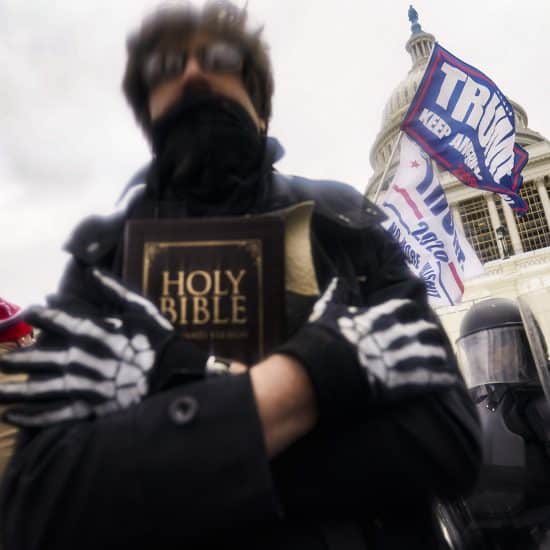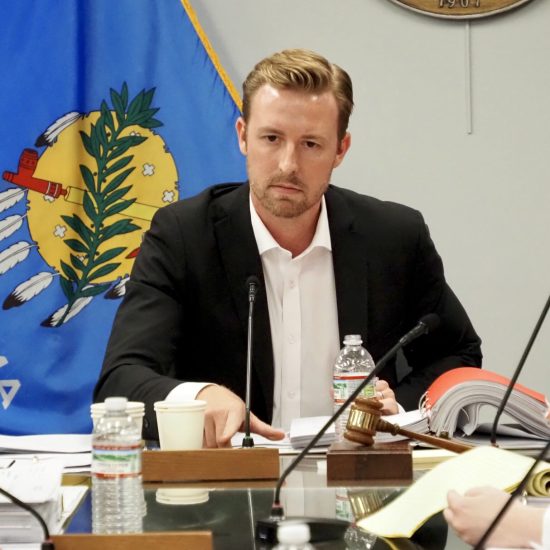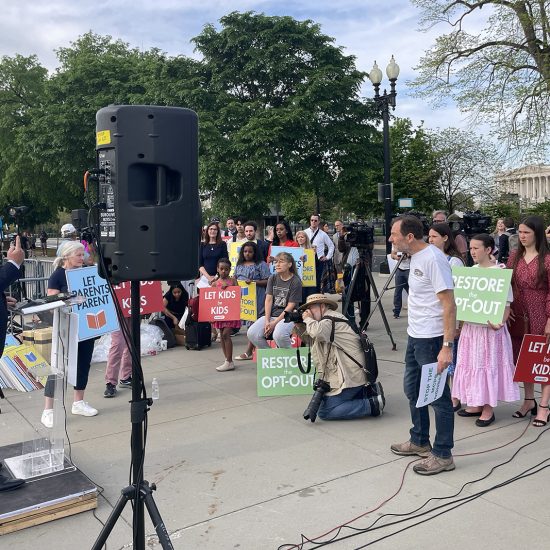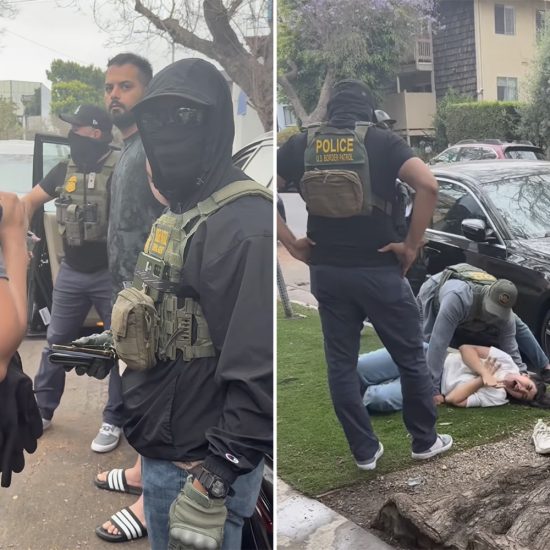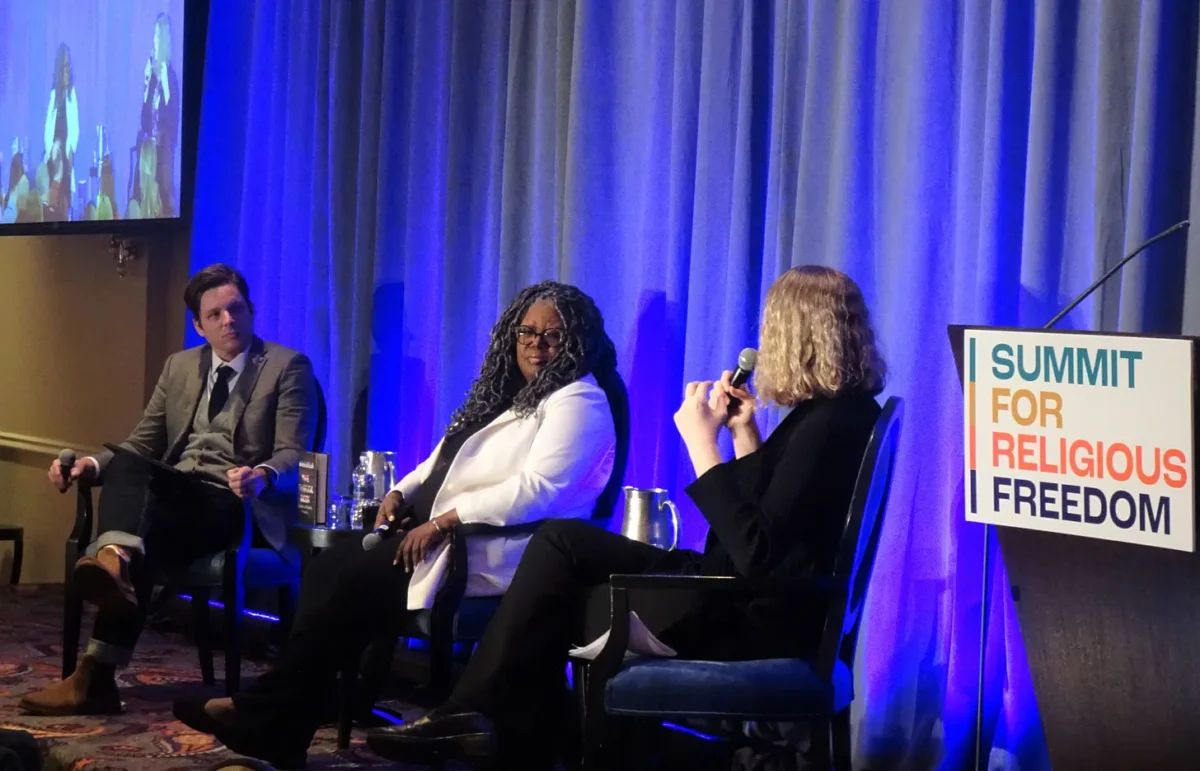
“I’m here to tell you that I am not going to make you happy this morning. People don’t call me because I make you happy. They call me because I come to scare you.”
With that quip and laughter from the crowd, Anthea Butler started her remarks at the second annual Summit for Religious Freedom in Washington, D.C., this week. The Summit was organized by Americans United for Separation of Church and State (where I serve as a board member).
After joking about why she was invited, the religious studies professor at the University of Pennsylvania who wrote White Evangelical Racism offered a sobering look at the threats to church-state separation in the United States today. Warning “we are at a moment of crisis in this country,” Butler argued the threat of White Christian Nationalism “is about a dismantling of what we have known as democracy.” More than just about religious beliefs, she added, the goal of those espousing Christian Nationalism “is about fundamentally changing America.”
“What I’m here to say about Christian Nationalism is this: It is probably one of the most dangerous things that has happened in this country. Because it’s not simply about love of country and love of Jesus, and Jesus will be involved in the country,” Bulter argued. “What they want is a theocracy.”
“Church and state separation is going to be obliterated,” she added about what will happen if a Christian Nationalist agenda wins. “And it’s already cracked in so many places. It’s hanging on by a thread right now because what you have are people like Sean Feucht and others who are telling people every Sunday that God wants to run this government and we are God’s messengers.”
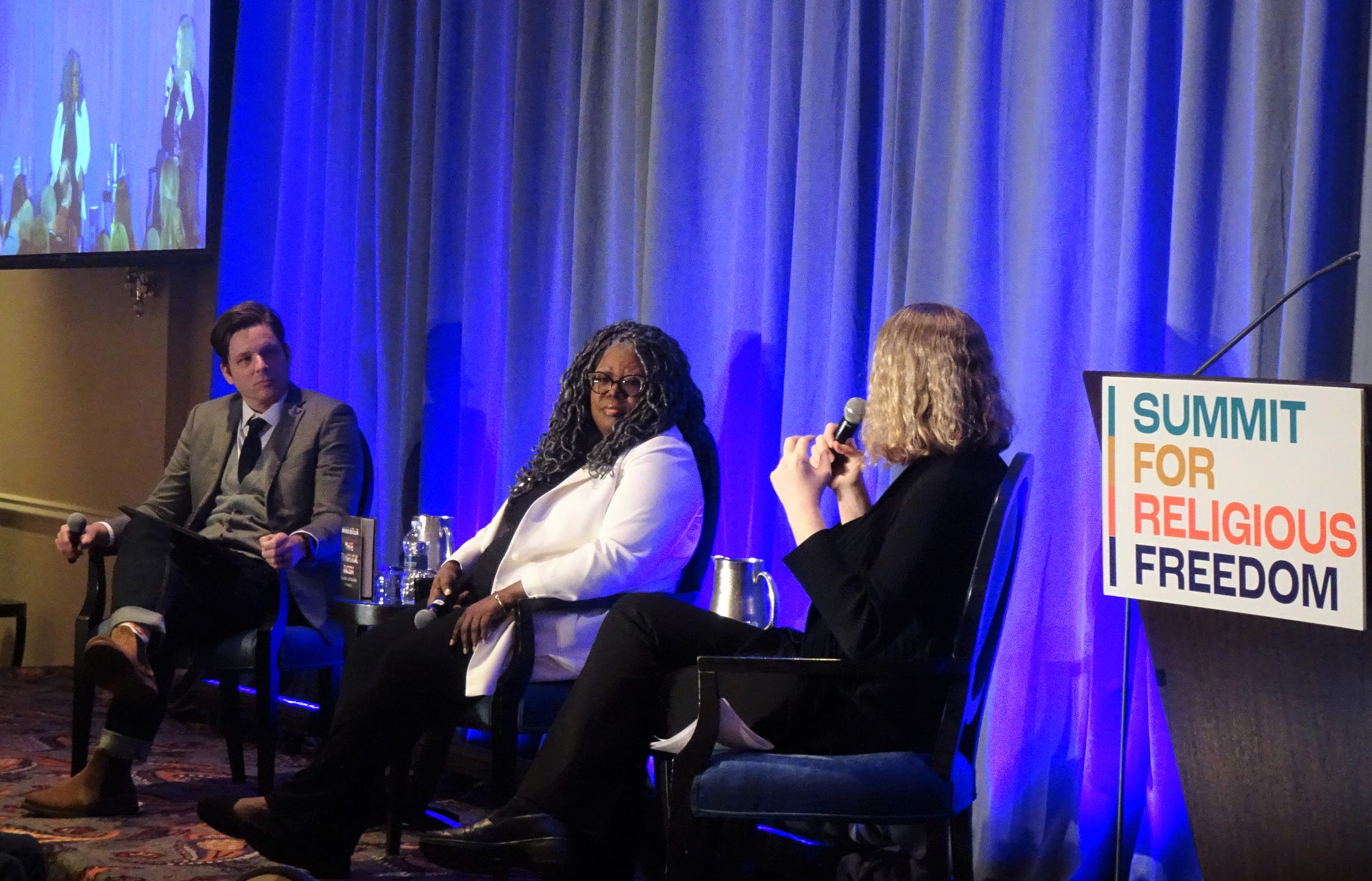
A panel conversation after the keynote talk by Anthea Butler (center) with Andrew Seidel (left) and Alison Gill at the Summit for Religious Freedom in Washington, D.C., on April 14, 2024. (Brian Kaylor/Word&Way)
As Butler noted, church-state separation offers a significantly different vision of what the U.S. should look like than what those pushing for a “Christian” nation desire. Rachel Laser, president and CEO of Americans United, explained as she kicked off the Summit that the separation of church and state is “one of the key pillars of [U.S.] democracy … because church-state separation is, in fact, what unlocks that freedom to be different.”
“The wall of separation between church and state is not a wall that divides us. It’s a wall that unifies us, that ensures that no one is favored, that allows us to thrive in our differences,” Laser explained. “Think of all the things that church-state separation does for us when the wall of separation is tall and strong and impregnable. It allowed my Jewish ancestors to flee religious persecution.”
“It’s church-state separation that protects freedom without favor and equality without exception, that enables each of us to live as ourselves and believe as we choose,” she added. “That’s why we’re all here across these differences, and divides even, fighting for church-state separation.”
However, Laser, Butler, and others emphasized that the constitutional principle of church-state separation is under attack by those pushing for Christian Nationalism in public schools, state legislatures, federal courts, the Oval Office, and elsewhere. As Laser put it, “We are facing existential threats against church-state separation and against our democracy.” So this issue of A Public Witness takes you inside the Summit for Religious Freedom to hear about why church-state separation matters for democracy and the vitality of the Christian witness.
Threatening Democracy
Rep. Jamie Raskin, a Democrat from Maryland, spoke about the threats posed by Christian Nationalism. As he discussed “the struggle today for democracy,” he urged those present to support constitutional principles like church-state separation.
Raskin reflected on his experiences during the Jan. 6, 2021, insurrection when “we saw the unleashing of the forces of White Christian Nationalism against the Capitol, against the Congress as part of the assault on the presidential election.” Raskin, who was part of the House Select Committee that investigated the insurrection, acknowledged the official report did not give attention to the ideology because it was a compromise document from the committee members, but he added he believes Christian Nationalism was “a central characteristic of what took place on that day.”
“When we talk about people who want to substitute a different form of government for constitutional democracy, there’s nothing metaphorical or hyperbolic about it. We just saw that happen,” he added.
Because of that attack and other efforts to undermine democracy, he insisted “small-d democrats, small-r republicans have to stand up.” He added, “We’ve got to be very clear that we are defending democratic constitutionalism.”
Raskin specifically pushed back against some efforts to codify Christianity. In opposition to those who criticize the U.S. Supreme Court’s 1962 Engel v. Vitale decision, he insisted that despite what many people claim, the justices didn’t ban prayer in public schools.
“As long as there are pop math quizzes, there will be prayer in the public schools,” he said. “Anyone can pray whenever he or she wants to pray. It’s just the government cannot compose a script and then compel your children to participate against their will.”
He also pointed to efforts to put the Ten Commandments in public schools despite efforts by James Madison and Thomas Jefferson to create a nation with church-state separation. Raskin joked that if lawmakers are going to vote to endorse the Ten Commandments, “We should have to vote on each commandment separately … and you can’t vote for any commandment that you yourself have violated.”

Rep. Jamie Raskin (left) speaks at the Summit for Religious Freedom in Washington, D.C., on April 15, 2024, and Rachel Laser (right) speaks at the Summit on April 14, 2024. (Brian Kaylor/Word&Way)
Raskin co-chairs the Congressional Freethought Caucus, which recently released a report on the Christian Nationalism of Speaker Mike Johnson. He mentioned at the Summit that the caucus is not merely for atheists but instead “open to anyone and everyone who will defend the separation of church and state and America’s fundamental constitutional values and principles.”
Other speakers also highlighted how Christian Nationalism inherently finds itself fighting against democracy. Warnings included not just that the ideology runs in opposition to democracy in a pluralistic nation but also that those espousing Christian Nationalism often use violent, apocalyptic rhetoric.
“Christian Nationalism is anti-democratic,” constitutional lawyer Andrew Seidel, AU’s vice president of strategic communications and author of American Crusade: How the Supreme Court is Weaponizing Religious Freedom, argued. “It is anti-democratic because we are pluralistic people and [Christian Nationalism] does not want to see that. … If Christian Nationalism triumphs here, we don’t have a democracy.”
“I’m, frankly, worried about our democracy,” said journalist Katherine Stewart, author of The Power Worshippers: Inside the Dangerous Rise of Religious Nationalism, “I’m noticing a significant uptick in the rhetoric of violence. This is especially pronounced at ReAwaken America. … This is Trump’s inner circle that is promoting this kind of rhetoric, incredibly violent rhetoric and messaging.”
Get cutting-edge analysis and commentary like this in your inbox every week by subscribing today!
Threatening Christianity
In addition to undermining democracy in a pluralistic society, several speakers at the Summit also mentioned how Christian Nationalism distorts biblical teachings and harms the Christian witness. The speakers therefore stressed the importance of Christian leaders adding their voices against this dangerous ideology.
“The ironic thing is that this ideology of Christian Nationalism is one that leads to epic abomination, and that is absolutely counter to the Scripture, counter to biblical faith,” said Lisa Sharon Harper, president of Freedom Road and author of Fortune: How Race Broke My Family and the World — and How to Repair It All. “When we ask the question of what is it that’s going to bring people out of [Christian Nationalism], I really do think that it is needing the actual Jesus.”
Mentioning the film Bad Faith, a new documentary on Christian Nationalism that was shown at the Summit, Harper urged people not to see such work as anti-Christian: “It’s not a threat to Christianity. It’s a threat to White Christian Nationalism. That’s what it’s a threat to. It’s a threat to White religion.”
Anthea Butler, who is Catholic but mentioned her past experiences as an evangelical, said the anti-democratic goals of Christian Nationalism also misrepresent core Christian teachings. After playing a clip of musician Sean Feucht proudly proclaiming his Christian Nationalistic goals as part of the Great Commission, Butler argued this idea is a threat to both church and state.
“You just can’t have Christianity take over the state, because what you do then is you don’t have a democracy. … Because the people are not all Christian. You can’t just make everybody be Christian,” Butler explained. “The Great Commission is not about making everybody Christian in the country. That’s a misunderstanding of what that Scripture is all about.”
Butler urged pastors to challenge such comments and address Christian Nationalism: “Start talking about it in congregations and defining it and helping them to understand what it is.” She also encouraged pastors to “just say no” to mixing Christianity into patriotic holidays like the Fourth of July. Such intertwining of nationalism with Christianity, she added, runs counter to core Christian teachings.
“If you want to push it back on people, what was Jesus’s relationship to the nationalists during his time period? I mean, this man who got crucified by the state,” she added.
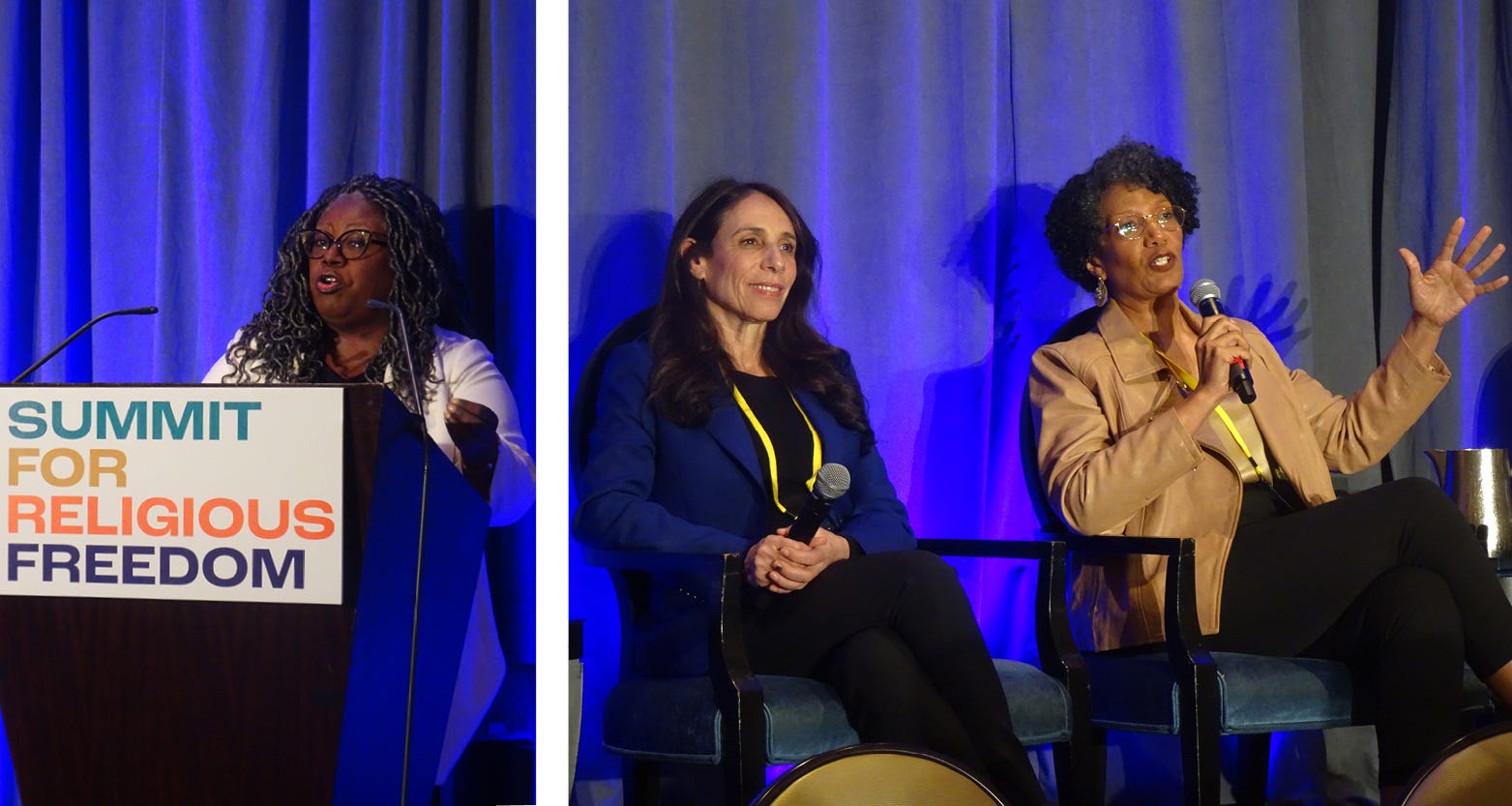
Anthea Butler (left) speaks at the Summit for Religious Freedom in Washington, D.C., on April 14, 2024, and Katherine Stewart listens as Lisa Sharon Harper (right) speaks during a panel conversation at the Summit on April 15, 2024. (Brian Kaylor/Word&Way)
The call for pastors to speak against Christian Nationalism also came from speakers of different faith traditions. Like from Rachel Laser, who is Jewish. And from Wajahat Ali, a Muslim columnist and author of Go Back to Where You Came From: And Other Helpful Recommendations on How to Become American. He noted it’s important that there are “a lot of White Christians who take their religion seriously” who are speaking against Christian Nationalism.
“White Christian allies in this country recognize the threat. They recognize that this movement has hijacked Christianity and is using and abusing Christianity,” Ali added. “You need White Christians to stand up and reclaim their faith.”
Similarly, Rep. Raskin, who is Jewish, noted that within Christianity there are “some very important voices saying, ‘That’s not what Christianity is, that’s not what it means, and they’re giving Christianity a bad name.’ So there’s got to be a struggle within that tradition, that faith.”
Perhaps the strongest warning about the danger of Christian Nationalism to Christianity came from a leading atheist advocate. Alison Gill, a vice president for American Atheists, noted that much of the work by those pushing Christian Nationalism today seems to be in response to changing demographics in the nation and younger generations disaffiliating from Christianity. But, she added, the political effort to codify Christianity won’t actually help win converts to Christianity.
“If you look at this stuff, you see how much of it is focused on young people, how much we focus on schools. Because there’s this idea, oh, if we put enough ‘In God We Trust’ signs up on the walls, and Ten Commandments, and we have prayer in schools, maybe we can stop this demographic slide,” Gill explained. “But it’s not working. And the more they try to force their rules onto other people, the more people will rebel from that.”
As a public witness,
Brian Kaylor


